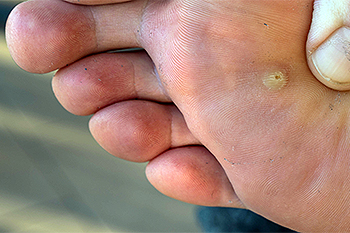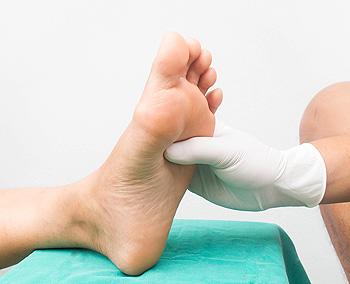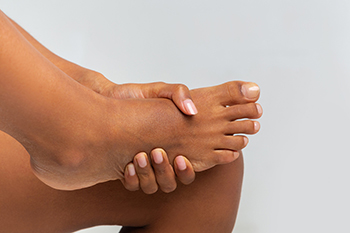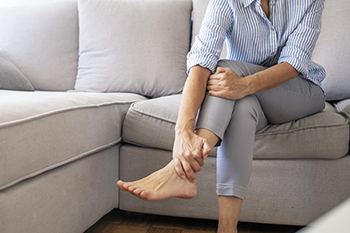Connect With Us
Blog
Items filtered by date: November 2023
Decoding the Telltale Symptoms of Plantar Warts

Plantar warts, though often benign, leave their mark on the soles of your feet with distinctive symptoms that merit attention. Typically emerging as flat or slightly raised growths, these warts exhibit a rough texture and may feature small black dots known as wart seeds, caused by clotted blood vessels. While the appearance is unmistakable, it is the discomfort that often draws attention. Plantar warts can cause pain or tenderness, especially while standing or walking, as the pressure on the wart exacerbates the discomfort. The surrounding skin may take on a calloused appearance, and the warts themselves can vary in size. Plantar warts thrive in warm, moist environments, making them frequent visitors to communal spaces like swimming pools or locker rooms. Recognizing these symptoms enables early identification and intervention, ensuring a more comfortable and expedited resolution of this common foot ailment. Plantar warts require the medical attention of a podiatrist, and if you have this ailment, it is suggested that you contact this type of doctor who can offer effective remedies for the accompanying pain and discomfort.
Plantar warts can be very uncomfortable. If you need your feet checked, contact Dr. David Ungar from Personal Foot Care. Our doctor will assist you with all of your foot and ankle needs.
About Plantar Warts
Plantar warts are the result of HPV, or human papillomavirus, getting into open wounds on the feet. They are mostly found on the heels or balls of the feet.
While plantar warts are generally harmless, those experiencing excessive pain or those suffering from diabetes or a compromised immune system require immediate medical care. Plantar warts are easily diagnosed, usually through scraping off a bit of rough skin or by getting a biopsy.
Symptoms
- Lesions on the bottom of your feet, usually rough and grainy
- Hard or thick callused spots
- Wart seeds, which are small clotted blood vessels that look like little black spots
- Pain, discomfort, or tenderness of your feet when walking or standing
Treatment
- Freezing
- Electric tool removal
- Laser Treatment
- Topical Creams (prescription only)
- Over-the-counter medications
To help prevent developing plantar warts, avoid walking barefoot over abrasive surfaces that can cause cuts or wounds for HPV to get into. Avoiding direct contact with other warts, as well as not picking or rubbing existing warts, can help prevent the further spread of plantar warts. However, if you think you have developed plantar warts, speak to your podiatrist. He or she can diagnose the warts on your feet and recommend the appropriate treatment options.
If you have any questions, please feel free to contact our office located in Farmington, MI . We offer the newest diagnostic and treatment technologies for all your foot care needs.
Causes of Peripheral and Diabetic Neuropathy

Peripheral neuropathy affects parts of the nervous system that send signals to the extremities. Symptoms typically emerge in the toes and feet before symmetrically progressing up the legs. In diabetic neuropathy, another prevalent type, symptoms initiate in both feet, extend to the calves, and may reach the hands. Symptoms include a tingling sensation, burning pain, loss of feeling, and the inability to sense temperature or vibration. While diabetic neuropathy can cause tingling, numbness, and reduced sensation, weakness is less prominent. Notably, a significant number of individuals with diabetic neuropathy may not experience pain, despite reduced sensation. This puts them at risk of neglecting proper foot care and potentially leading to serious injuries, or in severe cases, limb loss. Diabetes is a major contributor to peripheral neuropathy, and nerve compression, excessive alcohol consumption, toxin exposure, and certain medications such chemotherapy can also cause this condition. Autoimmune diseases, hereditary conditions, thyroid disease, and kidney or liver diseases are other potential triggers. If you believe you are suffering from peripheral or diabetic neuropathy in the feet, it is suggested that you make an appointment with a podiatrist for an exam and treatment options.
Neuropathy
Neuropathy can be a potentially serious condition, especially if it is left undiagnosed. If you have any concerns that you may be experiencing nerve loss in your feet, consult with Dr. David Ungar from Personal Foot Care. Our doctor will assess your condition and provide you with quality foot and ankle treatment for neuropathy.
What Is Neuropathy?
Neuropathy is a condition that leads to damage to the nerves in the body. Peripheral neuropathy, or neuropathy that affects your peripheral nervous system, usually occurs in the feet. Neuropathy can be triggered by a number of different causes. Such causes include diabetes, infections, cancers, disorders, and toxic substances.
Symptoms of Neuropathy Include:
- Numbness
- Sensation loss
- Prickling and tingling sensations
- Throbbing, freezing, burning pains
- Muscle weakness
Those with diabetes are at serious risk due to being unable to feel an ulcer on their feet. Diabetics usually also suffer from poor blood circulation. This can lead to the wound not healing, infections occurring, and the limb may have to be amputated.
Treatment
To treat neuropathy in the foot, podiatrists will first diagnose the cause of the neuropathy. Figuring out the underlying cause of the neuropathy will allow the podiatrist to prescribe the best treatment, whether it be caused by diabetes, toxic substance exposure, infection, etc. If the nerve has not died, then it’s possible that sensation may be able to return to the foot.
Pain medication may be issued for pain. Electrical nerve stimulation can be used to stimulate nerves. If the neuropathy is caused from pressure on the nerves, then surgery may be necessary.
If you have any questions, please feel free to contact our office located in Farmington, MI . We offer the newest diagnostic and treatment technologies for all your foot care needs.
Warning Signs From Your Feet

The condition of your feet can offer valuable insights into your overall health. For instance, if your feet are persistently cold, it may signal hypothyroidism, a condition that slows your metabolism. Yellow toenails may be a sign of lymphedema or respiratory issues. Persistent yellowing warrants a visit to a podiatrist for a diagnosis and treatment options. Painful foot cramps can result from dehydration or nutrient deficiencies. It is a good idea to stay hydrated, maintain a balanced diet, and consider drinking low-calorie sports drinks with electrolytes to prevent and relieve foot cramps. An enlarged, painful big toe may indicate gout. This is a form of arthritis that often affects the big toe. It results from an overabundance of purines in the system and can cause flare ups of extreme pain, swelling, and redness in the big toe. Reducing the risk of gout involves moderating alcohol intake and avoiding red meat and seafood consumption. If you are experiencing unusual types of foot problems, or suspect you may have gout, it is suggested that you make an appointment with a podiatrist for a full diagnosis and treatment options.
Everyday foot care is very important to prevent infection and other foot ailments. If you need your feet checked, contact Dr. David Ungar from Personal Foot Care. Our doctor can provide the care you need to keep you pain-free and on your feet.
Everyday Foot Care
Often, people take care of their bodies, face and hair more so than they do for their feet. But the feet are a very important aspect of our bodies, and one that we should pay more attention to. Without our feet, we would not be able to perform most daily tasks.
It is best to check your feet regularly to make sure there are no new bruises or cuts that you may not have noticed before. For dry feet, moisturizer can easily be a remedy and can be applied as often as necessary to the affected areas. Wearing shoes that fit well can also help you maintain good foot health, as well as making it easier to walk and do daily activities without the stress or pain of ill-fitting shoes, high heels, or even flip flops. Wearing clean socks with closed shoes is important to ensure that sweat and bacteria do not accumulate within the shoe. Clean socks help to prevent Athlete’s foot, fungi problems, bad odors, and can absorb sweat.
If you have any questions, please feel free to contact our office located in Farmington, MI . We offer the newest diagnostic and treatment technologies for all your foot care needs.
Plantar Warts Can Be Treated!
Types of Arthritis That Can Impact the Feet

Various forms of arthritis can have specific effects on the feet. Osteoarthritis, or OA, most often affects the first metatarsophalangeal joint, connecting the big toe to the foot. It can also be found in the midfoot and ankle. In contrast, rheumatoid arthritis, or RA, typically appears in both feet and affects the same joints symmetrically. Gout is known for frequently targeting the feet, particularly the big toe, and causing intense pain during flares ups. Psoriatic arthritis, or PsA, can impact the toes, leading to swollen, sausage-like digits known as dactylitis. Additionally, it often involves inflammation at the points where tendons and ligaments attach to bones. The feet can be affected, resulting in plantar fasciitis and painful bone spurs, among other conditions. Ankylosing spondylitis also brings about plantar fasciitis and discomfort at the Achilles tendon, affecting the feet. Each of these types of arthritis presents distinct challenges and symptoms in the foot region. If you have foot pain, it is suggested that you make an appointment with a podiatrist to discuss whether arthritis may be the cause. This type of doctor can determine what type of arthritis has developed and guide you toward the necessary treatments for relief.
Arthritis can be a difficult condition to live with. If you are seeking treatment, contact Dr. David Ungar from Personal Foot Care. Our doctor can provide the care you need to keep you pain-free and on your feet.
Arthritic Foot Care
Arthritis is a term that is commonly used to describe joint pain. The condition itself can occur to anyone of any age, race, or gender, and there are over 100 types of it. Nevertheless, arthritis is more commonly found in women compared to men, and it is also more prevalent in those who are overweight. The causes of arthritis vary depending on which type of arthritis you have. Osteoarthritis for example, is often caused by injury, while rheumatoid arthritis is caused by a misdirected immune system.
Symptoms
- Swelling
- Pain
- Stiffness
- Decreased Range of Motion
Arthritic symptoms range in severity, and they may come and go. Some symptoms stay the same for several years but could potentially get worse with time. Severe cases of arthritis can prevent its sufferers from performing daily activities and make walking difficult.
Risk Factors
- Occupation – Occupations requiring repetitive knee movements have been linked to osteoarthritis
- Obesity – Excess weight can contribute to osteoarthritis development
- Infection – Microbial agents can infect the joints and trigger arthritis
- Joint Injuries – Damage to joints may lead to osteoarthritis
- Age – Risk increases with age
- Gender –Most types are more common in women
- Genetics – Arthritis can be hereditary
If you suspect your arthritis is affecting your feet, it is crucial that you see a podiatrist immediately. Your doctor will be able to address your specific case and help you decide which treatment method is best for you.
If you have any questions please feel free to contact our office located in Farmington, MI . We offer the newest diagnostic tools and technology to treat your foot and ankle needs.


